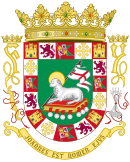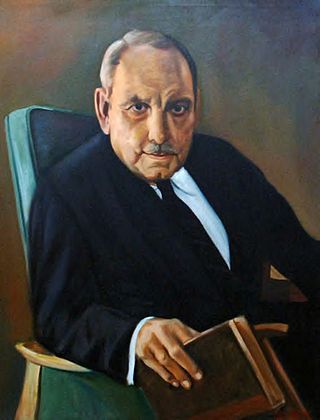
José Luis Alberto Muñoz Marín was a Puerto Rican journalist, politician, statesman and was the first elected governor of Puerto Rico, regarded as the "Architect of the Puerto Rico Commonwealth."

The Puerto Rican Socialist Party was a Marxist and pro-independence political party in Puerto Rico seeking the end of United States of America control on the Hispanic and Caribbean island of Puerto Rico. It proposed a "democratic workers' republic".

Antonio Rafael Barceló y Martínez was a Puerto Rican lawyer, businessman and the patriarch of what was to become one of Puerto Rico's most prominent political families. Barceló, who in 1917 became the first President of the Senate of Puerto Rico, played an instrumental role in the introduction and passage of legislation which permitted the realization of the School of Tropical Medicine and the construction of a Capitol building in Puerto Rico.

Santiago Iglesias Pantín, was a Spanish-born Puerto Rican socialist and trade union activist. Iglesias is best remembered as a leading supporter of statehood for Puerto Rico, and as the Resident Commissioner of Puerto Rico in the U.S. Congress from 1933 to 1939.
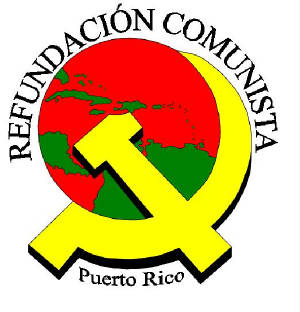
The Socialist Front is a coalition of far-left and pro-independence political organizations in Puerto Rico. The Socialist Front also includes non-partisan activists.

Bolívar Pagán Lucca was a Puerto Rican historian, journalist, and politician.

The Socialist Party, also known as Socialista Obrero, was a pro-statehood political party in Puerto Rico, that also contemplated independence in the case that entry into the American Union was denied by Congress. The party was concerned with improving the social welfare of Puerto Ricans.

The Union of Puerto Rico, also known as the Unionist Party, was a major political party in Puerto Rico in the early 20th century. The Union of Puerto Rico was known as the dominant political party of the island from 1904 to 1932. UPR founder Luis Muñoz Rivera also founded La Democracia, which effectively acted as the UPR publication. On 19 February 1904, the Union of Puerto Rico party became the first mass party to advocate for independence for Puerto Rico in the form of a sovereign nation.

Partido Republicano Puertorriqueño was a political party founded in Puerto Rico on July 4, 1899. The party dissolved in 1924 when it split into two factions, both factions forming alliances with other local parties. It was led by Dr. José Celso Barbosa.
The Free Federation of Workers was a union federation in Puerto Rico. It was founded in 1899 and initially led by Santiago Iglesias Pantín. Its political arm became the Socialist Party, founded in 1915.
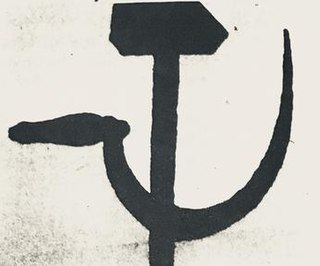
The Puerto Rican Communist Party was a communist party in Puerto Rico founded on 23 September 1934 following the sugar strikes on the island that same year. Relevant members include General Secretary Alberto E. Sánchez, president Juan Santos Rivera, and Jose A. Lanauze Rolón. The party emerged out of a turbulent political moment where faith in previous workers parties and organizations, such as the Socialist Party and the Free Federation of Workers, was waning and the Puerto Rican economy was experiencing a downturn. While membership remained small, the PCP interacted and influenced the labor and political space of mid-20th century Puerto Rico as well as political spaces outside of the island. These interactions include those with the Popular Democratic Party, The Communist Party of the United States of America, and the Nationalist Party of Puerto Rico.
The Puerto Rican Workers' Revolutionary Party is a far-left political party in Puerto Rico.

The political party strength in Puerto Rico has been held by different political parties in the history of Puerto Rico. Today, that strength is primarily held by two parties, namely:

The history of Puerto Rico began with the settlement of the Ortoiroid people before 430 BC. At the time of Christopher Columbus's arrival in the New World in 1493, the dominant indigenous culture was that of the Taínos. The Taíno people's numbers went dangerously low during the later half of the 16th century because of new infectious diseases carried by Europeans, exploitation by Spanish settlers, and warfare.

The Puerto Rican Autonomist Party was a political party in Puerto Rico founded in 1887. The Party was founded in Ponce, Puerto Rico, and its first chairman was Román Baldorioty de Castro. He was followed by Martin Corchado, a prominent physician from Ponce. Juan Hernández López was one of the co-authors of its program in 1897.

The Workers' Socialist Movement is a Puerto Rican democratic socialist revolutionary organization, formed in 1982 and dedicated to the self-organization and self-emancipation of the working-class in Puerto Rico, as well as international solidarity with the workers struggles worldwide. It is usually known as the "MST", and its youth section is the Unión de Juventudes Socialistas, also known as the "UJS-MST" or simply "UJS". The MST supports a socialist and independent Puerto Rico.

The Working People's Party was a Puerto Rican socialist political party. It was founded on December 5, 2010, in the city of San Juan, Puerto Rico, by a group of activists, students, teachers, professors, union workers, actors, and public and private employees. As of 2016, the party had no opinion on the issue of the political status of Puerto Rico, instead saying that they believe the decision should be made by the people of Puerto Rico in a referendum.
Anarchism as a social movement is one of the manifestations of the political left within the working classes of Puerto Rico, having its peak during the late 19th and early 20th century. Anarchism was predominantly present within, but not exclusive to, the working classes that emerged as the sociopolitical environment changed. The municipalities of Caguas and Bayamón were the epicenters of the movement. It was also recorded in other industrial centers, such as Ponce, San Juan, Arecibo, Cayey, Cidra, Juncos, Vega Baja, Utuado, Lares, Yauco and Mayagüez. Despite sharing some core values, Puerto Rican anarchism was heterogeneous in nature. In general, Puerto Rican anarchism was distinctly anti-organized religion, in particular against the Catholic Church that had retained considerable influence since the beginning of Spanish colonialism. Following the Treaty of Paris, it also grew to oppose American sovereignty, as it perceived that the island was being forced into servitude with an Americanization initiative, leading to distinct antiauthoritarian stances against both foreign and local politicians, the wealthy higher classes and American labor unions. However, on principle the anarchists opposed joining the independence movement.
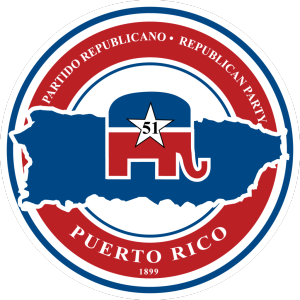
The Republican Party of Puerto Rico is the local affiliate of the national United States Republican Party in Puerto Rico. The affiliation started in 1903. The party does not participate in the November elections mandated by the Constitution of Puerto Rico for local registered political parties because it is not a registered party in Puerto Rico for local electoral purposes. Instead, the party holds its own elections to select the Puerto Rico delegates to the Republican National Convention and holds presidential primaries on the last Sunday of February.
